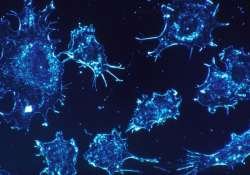'Smart'device that engineers cells to kill cancer
New York : In a path-breaking discovery, biologists have created a new technology for modifying human cells to create therapeutics that could travel the body and selectively target and kill cancer cells without disrupting healthy

New York : In a path-breaking discovery, biologists have created a new technology for modifying human cells to create therapeutics that could travel the body and selectively target and kill cancer cells without disrupting healthy cells.
This device is a protein biosensor that sits on the surface of a cell and can be programmed to sense specific external factors.
After detecting these factors, the device sends a signal into the engineered cell's nucleus to activate a gene expression programme.
"Till date, there was no way to engineer cells in a manner that allowed them to sense key pieces of information about their environment, which could indicate whether the engineered cell is in healthy tissue or sitting next to a tumour,” explained Joshua Leonard, an assistant professor at Northwestern University's McCormick school of engineering and applied science.
For example, the engineered cell could detect big, soluble protein molecules that indicate that it is next to a tumour.
“Since this toxic programme would be activated only near tumour cells, such an approach could minimise side effects as well as improve therapeutic benefits,” Leonard added.
The biosensor platform is highly modular, enabling the biosensors to be customised to recognise factors of relevance to various patients' needs.
“In that way, you could programme a cell-based therapy to specify which cells it should kill,” Leonard added.
Doctors could potentially collect immune cells from a patient's body, engineer the cells using the biosensor platform and put them back into the patient.
“From there, the cells would do the work of detecting cancer or the disease they are designed to identify,” the researchers added.
The study has been published in the journal ACS Synthetic Biology.
This device is a protein biosensor that sits on the surface of a cell and can be programmed to sense specific external factors.
After detecting these factors, the device sends a signal into the engineered cell's nucleus to activate a gene expression programme.
"Till date, there was no way to engineer cells in a manner that allowed them to sense key pieces of information about their environment, which could indicate whether the engineered cell is in healthy tissue or sitting next to a tumour,” explained Joshua Leonard, an assistant professor at Northwestern University's McCormick school of engineering and applied science.
For example, the engineered cell could detect big, soluble protein molecules that indicate that it is next to a tumour.
“Since this toxic programme would be activated only near tumour cells, such an approach could minimise side effects as well as improve therapeutic benefits,” Leonard added.
The biosensor platform is highly modular, enabling the biosensors to be customised to recognise factors of relevance to various patients' needs.
“In that way, you could programme a cell-based therapy to specify which cells it should kill,” Leonard added.
Doctors could potentially collect immune cells from a patient's body, engineer the cells using the biosensor platform and put them back into the patient.
“From there, the cells would do the work of detecting cancer or the disease they are designed to identify,” the researchers added.
The study has been published in the journal ACS Synthetic Biology.